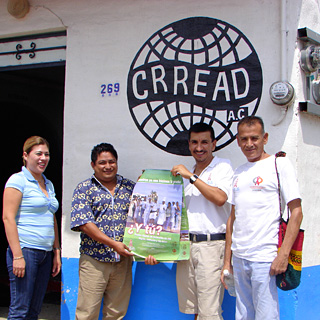
|  |  |  Health & Beauty | October 2008 Health & Beauty | October 2008  
Fighting HIV in the Banderas Bay Region
 Ed Thomas - PVNN Ed Thomas - PVNN


| Upcoming VES Health Fair Events
• Friday, October 17th, 10 am-2 pm, San Salvador and Brasilia, Colonia 5 de Diciembre
• Sunday, October 26th, 10 am-2 pm, Unidad Deportiva Jardines, Colonia Jardines
• Sunday, November 2nd, 10 am-2 pm, Manantial and Lima, Colonia Buenos Aires
• Saturday, November 8th, 10 am-2 pm, Paseo de las Palmas and Libramiento Luís Donaldo Colosio, Col. Barrio Sta. María | | |
On Wednesday, October 8th, the VES team along with volunteer Sergio and CAPASITS clinical-social worker Mina ventured out into new waters. They went to C.R.R.E.A.D., (Centro de Recuperación y Rehabilitación para Enfermos de Alcoholismo y Drogadicción, A.C.) in Colonia Independencia.

While there, they ran an open-forum question and answer education seminar on HIV/AIDS and STDs (sexually transmitted diseases.) There were 35 residents in attendance all of whom participated in the program, which also included demonstrations on the proper use of male condoms and the advantage of using lubricants.

Many of the participants were not sure what "risky behavior" is and when one should be tested. After the one-hour seminar, free confidential HIV rapid testing was offered and twenty-two of the participants chose to be tested at that time.

Before leaving C.R.R.E.A.D., the team was given permission to hang posters about HIV/AIDS and the rapid test and testing sites in the common area as well as in the rehab center's visiting area. They also provided the center with a box of condoms for distribution.

On Saturday, October 11th, the VES mobile detection team along with CAPASITS Mina, Dr. Galileo and administrator Alondra traveled 35 kms to the Plaza Principal in Colonia Las Palmas for this week's VES Health Fair. Also along with the team were three new VES volunteers: Luis, and the two youngest volunteers to date, Eduardo, 18 and Arnoldo, 20.

The Health Fair was held in the center of town and the VES team was able to set up at the kiosk for test results. The town delegate was very helpful in the set up, as he provided tables and chairs, which made it so much easier and faster to set up the testing area.

Another new tool in the educating process was introduced at this testing. It is a pictorial explanation of the difference between HIV/AIDS-risky behaviors-modes of transmission-and what the test is, courtesy of COESIDA. All-in-all it was another very successful day with 41 tests performed (80% of those tested were women) - a good response from a town that size.

Should I get tested?

The following are behaviors that increase your chances of getting HIV. If you answer yes to any of them, you should definitely get an HIV test.

• Have you injected drugs or steroids or shared equipment (such as needles, syringes, works) with others?

• Have you had unprotected vaginal, anal, or oral sex with multiple partners, or anonymous partners?

If you have had sex with someone whose history of sex partners and/or drug use is unknown to you, or if you or your partner has had many sex partners, then you have more of a chance of being infected with HIV. Both you and your new partner should get tested for HIV, and learn the results, before having sex for the first time.

For women who plan to become pregnant, testing is even more important. If a woman is infected with HIV, medical care and certain drugs given during pregnancy can lower the chance of passing HIV to her baby. All women who are pregnant should be tested during each pregnancy.

How long after a possible exposure should I wait to get tested for HIV?

Most HIV tests are antibody tests that measure the antibodies your body makes against HIV. It can take some time for the immune system to produce enough antibodies for the antibody test to detect, and this time period can vary from person to person. This time period is commonly referred to as the "window period."

Most people will develop detectable antibodies within 2 to 8 weeks (the average is 25 days.) Even so, there is a chance that some individuals will take longer to develop detectable antibodies.Therefore, if the initial negative HIV test was conducted within the first 3 months after possible exposure, repeat testing should be considered >3 months after the exposure occurred to account for the possibility of a false-negative result. Ninety-seven percent of persons will develop antibodies in the first 3 months following the time of their infection. In very rare cases, it can take up to 6 months to develop antibodies to HIV.
 Puerto Vallarta's HIV/AIDS non-profit organization, Vallarta Enfrenta el SIDA, and CAPASITS, work together to provide high-quality medical care, counseling and psychological support, education and prevention programs, and outreach to at-risk communities in the Banderas Bay area. For information, assistance, or to volunteer or donate, please visit VallartaEnfrentaSida.org. To learn more about VES, click HERE. Puerto Vallarta's HIV/AIDS non-profit organization, Vallarta Enfrenta el SIDA, and CAPASITS, work together to provide high-quality medical care, counseling and psychological support, education and prevention programs, and outreach to at-risk communities in the Banderas Bay area. For information, assistance, or to volunteer or donate, please visit VallartaEnfrentaSida.org. To learn more about VES, click HERE. |

 |
|  |



